On June 12, 2024, we (Sarah Gotschall, Rebecca Fordon, and Sean Harrington) had the pleasure of presenting Improving the Creation of Legal Scholarship with Generative AI as part of the Association of American Law Schools (AALS) Technology Law section summer webinar series. If interested, you can watch the recording here or access the PowerPoint slides here.
(Oh, and by the way, be sure to register now to see Rebecca Rich and Jennifer Wondracek’s AI and Neurodiverse Students AALS Technology Law section presentation tomorrow, Wednesday, July 10, 2024, 2 p.m. eastern time!)
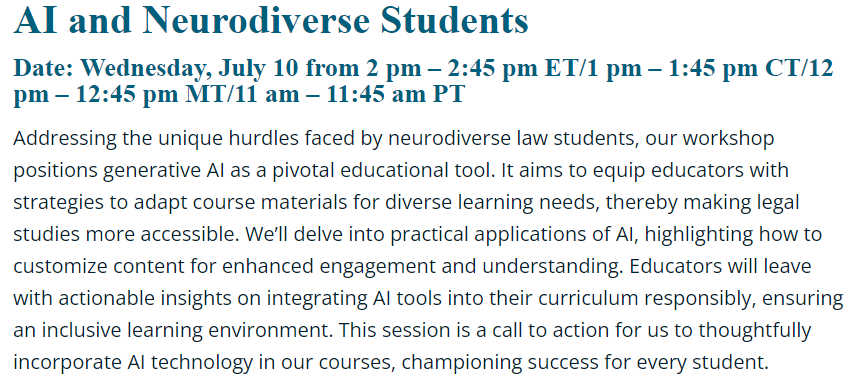
AI Tools for Scholarly Research
Anway, our presentation focused on the potential of AI in scholarly research, various AI tools with academic uses, and specific use cases for generative AI in legal scholarship. We discussed AI scholarly research tools that connect to databases, use semantic search, and construct answers using generative AI. We also touched upon specialty AI research tools, citation mapping AI, and law-specific scholarly research AI.
It’s important to note that many of the specialty AI systems, such as Consensus, Litmaps, and Elicit, currently have limited coverage of legal literature, particularly law review articles. As a result, these tools may be more useful for legal scholars conducting interdisciplinary research that draws upon sources from other fields. However, we are hopeful that these systems will expand their databases to include more legal literature in the future, making them even more valuable for legal scholarship.
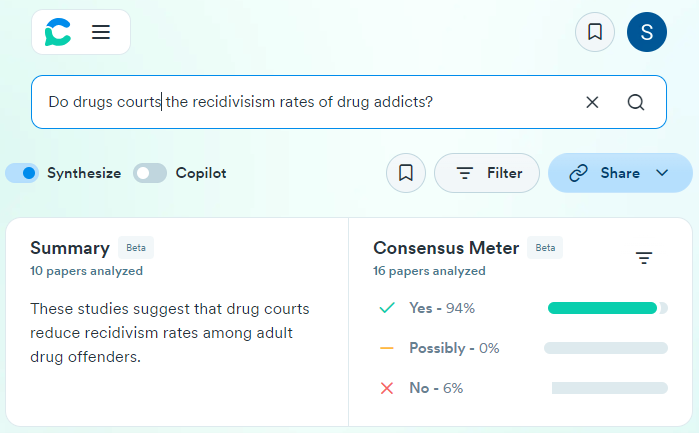
Specific AI Systems for Interdisciplinary Researchers
During the presentation, we delved into several specific AI systems that can be particularly useful for interdisciplinary reseachers:
- Consensus ($9/mo, with a more limited free version): A tool that connects to databases of academic research and uses generative AI to construct answers to queries.
- Litmaps ($10/mo, with a limited free version to test): A citation mapping AI that allows users to select or upload papers and find related papers within the same citation network, facilitating discovery and pattern identification.
- Elicit ($10/mo): An AI research tool that combines semantic search and generative AI to help researchers locate relevant information and generate insights.
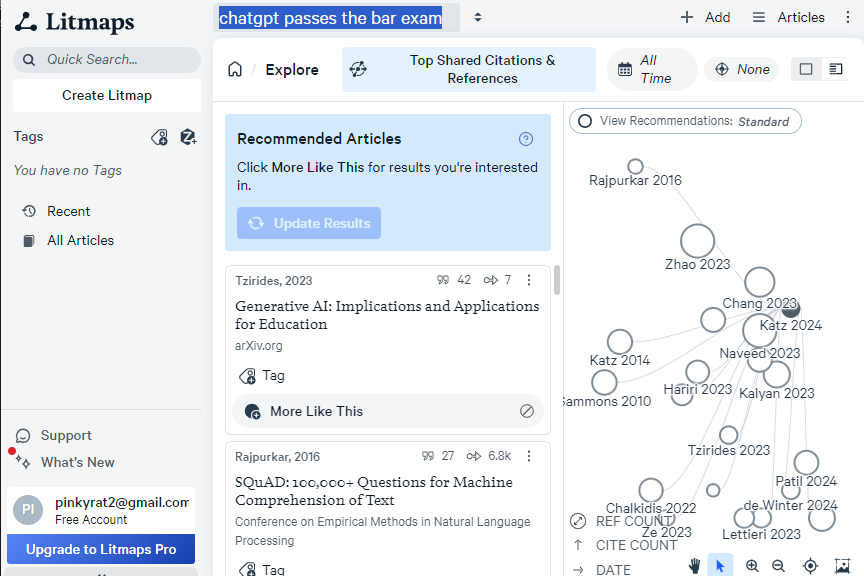
We also covered other noteworthy tools such as Scite Assistant ($20/mo), Semantic Scholar (free), Research GPT, Scholar GPT, Connected Papers ($6/mo), Research Rabbit (free), Inciteful (free), and more. These tools offer a range of features, from citation mapping to literature review assistance, making them valuable additions to a legal scholar’s toolkit.
General-Purpose AI Systems
In addition to these specialized tools, we discussed the potential of general-purpose AI systems like ChatGPT, Claude, and Perplexity AI for legal academic research and writing. These powerful language models can assist with various tasks, such as generating ideas, summarizing documents, and even drafting sections of papers. However, we emphasized the importance of using these tools responsibly and critically evaluating their output.
Custom GPTs
Another exciting development we covered was the creation of custom GPTs, or user-created versions of ChatGPT tailored to specific tasks. By providing a custom GPT with relevant documents and instructions, legal scholars can create powerful tools for their research and writing needs. We outlined a simple four-step process for building a custom GPT: creating instructions in a well-organized document, converting it to markdown, uploading relevant documents as a knowledge base, and determining the desired features (e.g., web browsing, image generation, or data analysis).
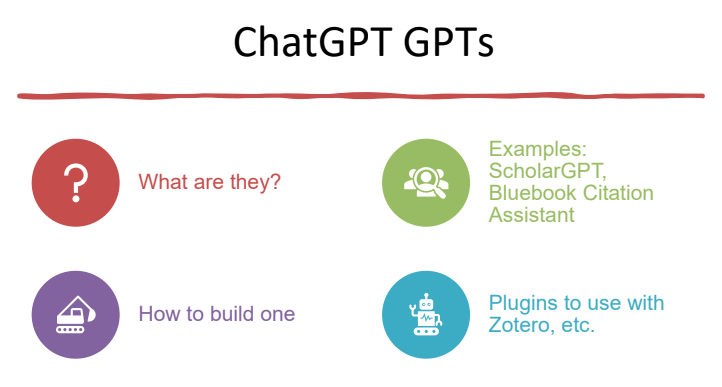
Use Cases for Generative AI in Legal Scholarship
Throughout the presentation, we explored several use cases for generative AI in legal scholarship, including targeted research and information retrieval, document summaries, analysis and synthesis, outlining, idea generation and brainstorming, drafting, and proofreading.
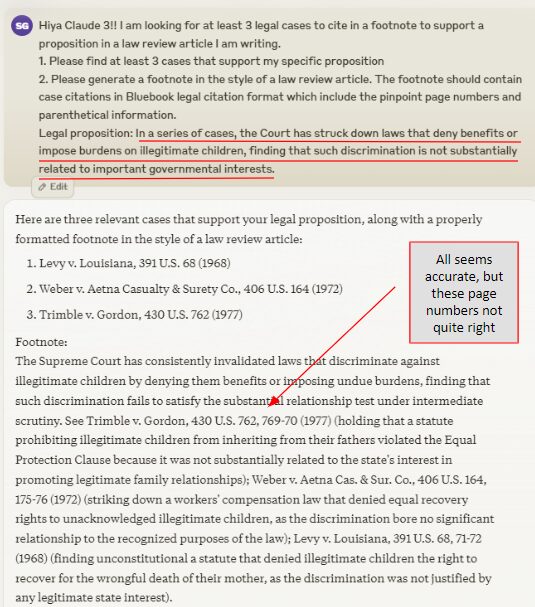
Important Considerations
We also addressed important considerations when using AI in academic work, such as citing AI-generated ideas, the implications of AI-generated content in scholarship, and the need for guidelines from industry groups and publishers. To provide context, we shared a list of articles discussing AI and legal scholarship and resources for learning more about using AI for legal scholarship.
Conclusion
Our presentation concluded by highlighting the potential of generative AI to assist in various aspects of legal scholarship while emphasizing the importance of ethical considerations and proper citation practices.
Other Info:
Resources to Learn More About Using AI for Legal Scholarship
- Georgetown University Law Library AI Tools Guide: Provides resources and information on various AI tools that can assist in research and scholarship. It includes descriptions of tools, ethical considerations, and practical tips for effectively incorporating AI into academic work.
- University of Washington Law Library Writing for and Publishing in Law Reviews: Provides resources and guidelines on using AI tools ethically in legal writing, including how to cite AI, maintain academic integrity, and the impact of AI on scholarly publishing.
- Citing Generative AI: Provides Bluebook advice on citing AI
- Andy Stapleton – YouTube: Videos provide tips and advice for researchers, students, and academics about how to use general GAI and specialty academic GAI for academic writing.
- Mushtaq Bilal – Twitter: Provides tips and resources for researchers and academics, particularly on how to improve their writing and publishing processes using GAI.
- Dr Lyndon Walker: Offers educational content on statistics, research methods, and data analysis, and explores the application of GAI in these areas
- Legal Tech Trends – Substack: Covers the latest trends and developments in legal technology and provides insights into how GAI is transforming the legal industry, including tools, software, and innovative practices.
Articles About AI and Legal Scholarship
- Will Machines Replace Us? Machine-Authored Texts and the Future of Scholarship, Benjamin Alarie, Arthur Cockfield, and GPT-3, Law, Technology and Humans, November 8, 2021. First AI generated law review article! It discusses the capabilities and limitations of GPT-3 in generating scholarly texts, questioning the future role of AI in legal scholarship and whether future advancements could potentially replace human authors.
- A Human Being Wrote This Law Review Article: GPT-3 and the Practice of Law, Amy B. Cyphert, UC Davis Law Review, November 2021. This article examines the ethical implications of using GPT-3 in legal practice, highlighting its potential benefits and risks, and proposing amendments to the Model Rules of Professional Conduct to address AI’s integration into the legal field.
- The Implications of ChatGPT for Legal Services and Society, Andrew M. Perlman, Suffolk University Law School, December 5, 2022. This paper, generated by ChatGPT-3.5 after it was first introduced, explores the sophisticated capabilities of AI in legal services, discussing its potential regulatory and ethical implications, its transformative impact on legal practices and society, and the imminent disruptions AI poses to traditional knowledge work.
- Using Artificial Intelligence in the Law Review Submissions Process, Brenda M. Simon, California Western School of Law, November 2022. This article explores the potential benefits and drawbacks of implementing AI in the law review submissions process, emphasizing its ability to enhance efficiency and reduce biases, while also highlighting concerns regarding the perpetuation of existing biases and the need for careful oversight.
- Is Artificial Intelligence Capable of Writing a Law Journal Article?, Roman M. Yankovskiy, Zakon (The Statute), Written: March 8, 2023; Posted: June 20, 2023, This article explores AI’s potential to create legal articles, examining its ability to handle legal terminology and argumentation, potential inaccuracies, copyright implications, and future prospects for AI in legal practice and research.
- Should Using an AI Text Generator to Produce Academic Writing Be Plagiarism?, Brian L. Frye and Chat GPT, Fordham Intellectual Property, Media & Entertainment Law Journal, 2023. This article provocatively addresses whether using AI text generators like ChatGPT to produce academic writing constitutes plagiarism, exploring the implications for originality, authorship, and the nature of scholarship in the digital age.
- Move Over Law Professors? AI Likes to Write Law Review Articles Too!, Sarah Gotschall, AI Law Librarians, March 28, 2024. This blog post examines the capabilities of the AI text generator Claude 3 in producing a law review article (Bloodlines Over Merits: Exposing the Discriminatory Impact of Legacy Preferences in College Admissions, Claudia Trey, SSRN, April 12, 2024), discussing its ability to generate well-written content with footnotes, the challenges encountered, and the potential future impact of AI on academic writing.
